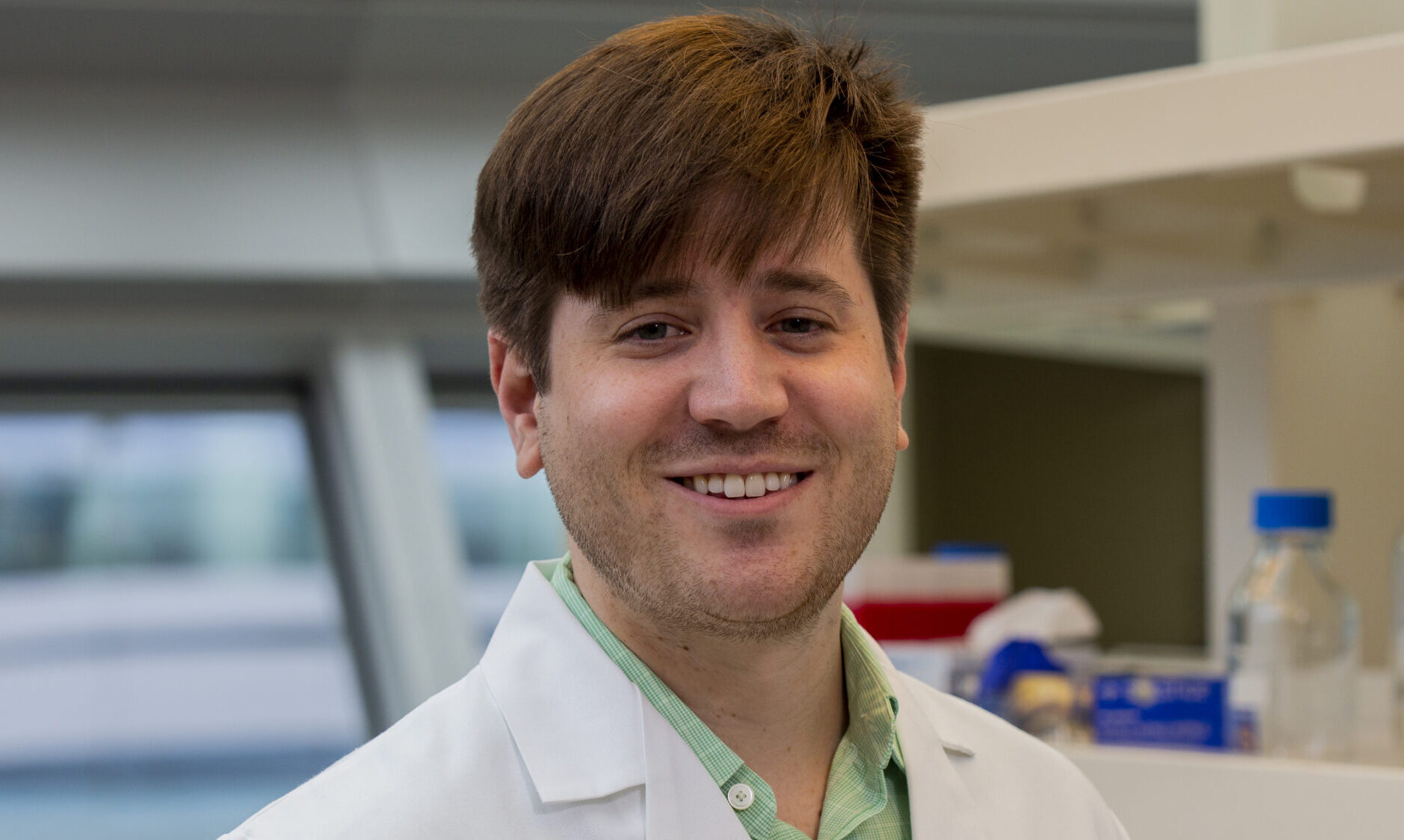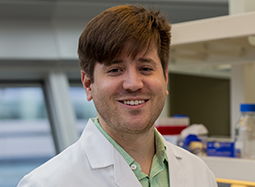Graduate student spotlight: Pursuing science and medicine to help build a healthier future
December 16, 2020

Throughout the year, we highlight Van Andel Institute Graduate School’s doctoral students. This month features Dylan Dues, an M.D./Ph.D. student in the lab of Dr. Darren Moore. Dylan studies how genes influence the mechanisms underlying two related types of dementia.

Q: How would you describe your area of study to someone without a scientific background?
DD: I study Parkinson’s disease dementia (PDD) and the related condition dementia with Lewy bodies (DLB). PDD and DLB are neurodegenerative disorders that cause progressive changes in the way patients think, act and move. In both conditions, a protein known as alpha-synuclein accumulates in the brain and forms clumps called Lewy bodies. As these clumps form, brain cells can stop working correctly and even die. My work focuses on understanding how genes influence this process. It is essential that we understand the connection between genetics and neurodegeneration in order to develop effective treatments.
Q: What is your primary motivation for persevering through graduate school?
DD: The brain is, in my opinion, the most beautiful organ in the human body, and I am passionate about the study of neuroscience. More importantly, medicine has little to offer patients afflicted by neurodegenerative disease in terms of curative or disease-modifying treatment. Graduate school has allowed me to be part of an effort to change that, and I am so grateful for the opportunity.
Q: What do you want to do with your degree?
DD: I want to combine my medical and scientific training to ultimately work as a physician-scientist, seeing patients and building a research program. I had a seminal moment as an undergraduate student when a neurologist revealed to me that medicine “didn’t have all the answers,” and that biomedical research held the promise of tomorrow’s cures. Since then, I’ve been committed to improving health and enhancing patients’ lives through biomedical research. A dual-degree program seems like a great way to start achieving this goal.
Q: Did you take time off before starting your Ph.D. degree or come directly from an undergraduate or master’s degree program?
DD: I spent three years working as a research technician at Van Andel Institute following the completion of my undergraduate degree. After enrolling in the Michigan State University-Van Andel Institute Graduate School M.D./Ph.D. program, I completed the first two years of medical school prior to starting graduate school. I found that having a delayed start was beneficial as it allowed me to be more dedicated with my efforts and better understand what I was getting myself into.
Q: How has your previous coursework contributed to your breadth of knowledge?
DD: Medical school provides a solid foundation for the basic sciences, but it doesn’t train you how to “think like a scientist” or how to conduct biomedical research. In graduate school, I’ve had to develop a complementary set of skills in order to apply my previous medical knowledge. Ultimately, I feel as though dual training is synergistic, in that my development as a physician and as a researcher is enhanced by both training paradigms.
Q: Do you think there is any value in social networking with other graduate students in non-related fields?
DD: Yes, absolutely! As science and technology become more advanced, it will be quite difficult for one person (or one field) to do it all. I think that most of the advancements in how we understand and manage human disease will stem from extensive interdisciplinary collaboration. When you are able to tackle a problem from different angles, the complexity is diminished, and you are able to see things that you might not have seen before. One of the perks of Van Andel Institute Graduate School is that I get to regularly interact with students in fields different from my own. I love being able to discuss my ideas and experiments with peers and gain a different perspective.
Q: How do you think earning an advanced degree will change your role in society?
DD: I think that a lot of time and effort (from many people) has gone into my training. I feel extremely privileged to be able to dedicate my time in this way. I plan on putting this exceptional training to work as a physician and as a member of the research community. Patients are counting on us!
Q: What is your favorite stress-reduction technique?
DD: Due to the pandemic, I’ve (out of necessity) had to seriously step up my culinary skills. I’ve found that I really enjoy learning how to prepare (and eat) good food. The kitchen can actually be quite similar to the laboratory in some ways — sometimes new recipes turn out horribly and, likewise, experiments don’t always pan out. The key is to never give up and to continuously strive for improvement.
Q: What accomplishment (academic or other) are you most proud of?
DD: I had an opportunity to work with my former high school biology teacher while working at VAI just prior to enrolling in the Graduate School. My experience as a student in her biology classroom had been pretty influential in my educational path and being able to work with her again at VAI was a rewarding experience. Through that program, she has since been able to expose high school students to real-world science and help them consider science as a career. We need to attract the best and brightest minds to biomedical research, and early exposure to real science is a good way to do just that!
Interested in Van Andel Institute Graduate School? Learn more at vaigs.vai.org and read previous student spotlights here.
